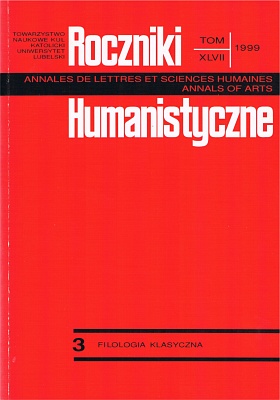Κριός for Hermes from the Ritual Calendar of the Deme of Erchia
Abstract
The first part of the paper (“Roczniki Humanistyczne”, 43 (1995), fasc. 3, pp. 25-39) is devoted to an analysis of the meaning of the word κρίος in the Greek leges sacrae; part two contains an interpretation of the offering, made of ram, for Hermes in the context of a local feast celebrated by the deme of Erchia on the fourth day of the month Thargelion. As a point of departure, the religious analysis of its significance has taken the place which the feast occupied in the structure of the ritual year of the deme. The religious association of pythaists combines the feast under discussion with two-day celebrations on the seventh and eighth days of the month Gamelion which were devoted to Apollo in his initiating function. Now the time of offering (the “Apolline” month Thargelion and the proximity of the state Thargelia) points to the cleansing character of the rituals of the deme of Erchia. The choice of the fourth day has a religious motivation and is conditioned by the role which Hermes played, a god who took the lead on the way of a cleansing pilgrimage or procession within the deme. Keryx was especially important. In the cult of Hermes he played the role of a priest and, with his religious knowledge, regulated the course of rites. To put six deities in one festive time leads to a conclusion that the majority of offerings on the fourth day of the month Thargelion are connected with the idea of cleansing the local community. The main role in this act was played by the local cult association of pythaists, an association which by way of a ritual renewed the local sanctuary of Apollo Pythios. The association fulfilled in the deme essential sacerdotal functions during two-day celebrations from the beginning of the month Gamelion. They had a character of an initiating feast and it is perhaps due to this fact that Anaks and their father Zeus were present among the deities receiving offering during the feast under analysis.
Copyright (c) 1999 Roczniki Humanistyczne

This work is licensed under a Creative Commons Attribution-NonCommercial-NoDerivatives 4.0 International License.





